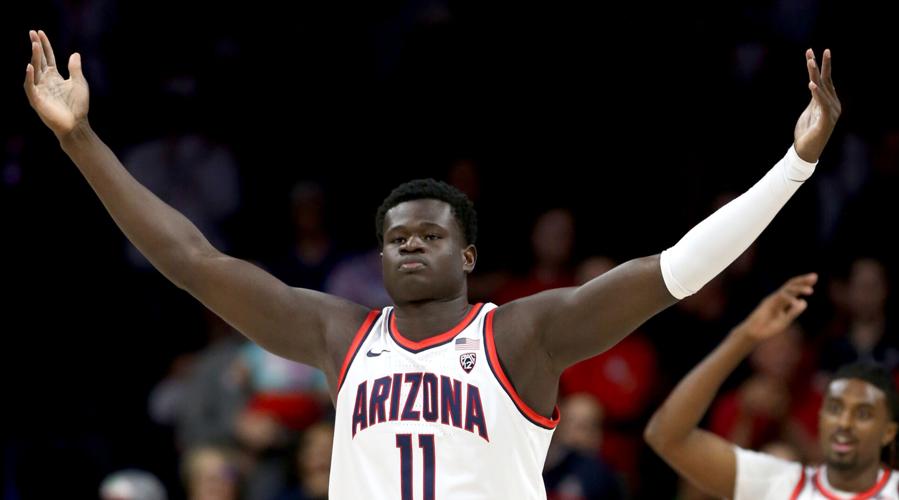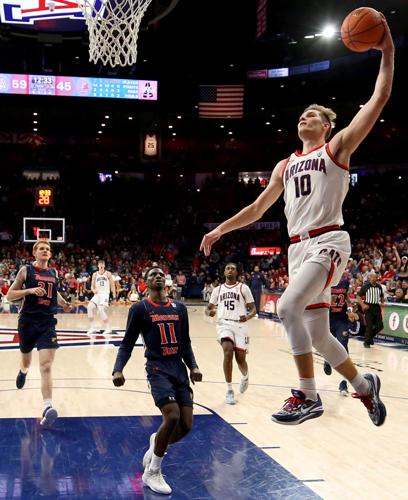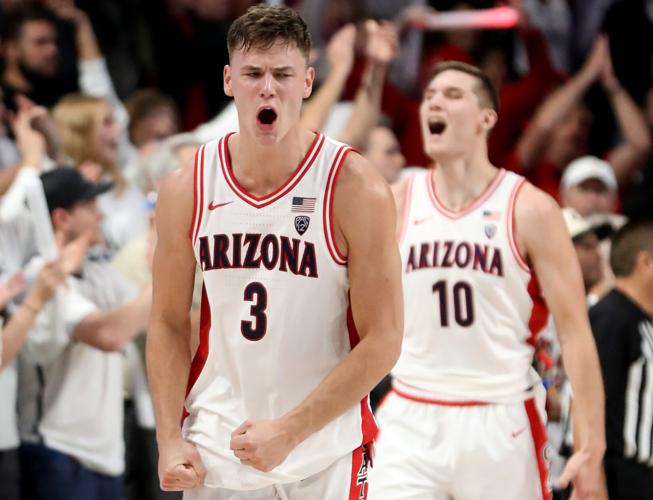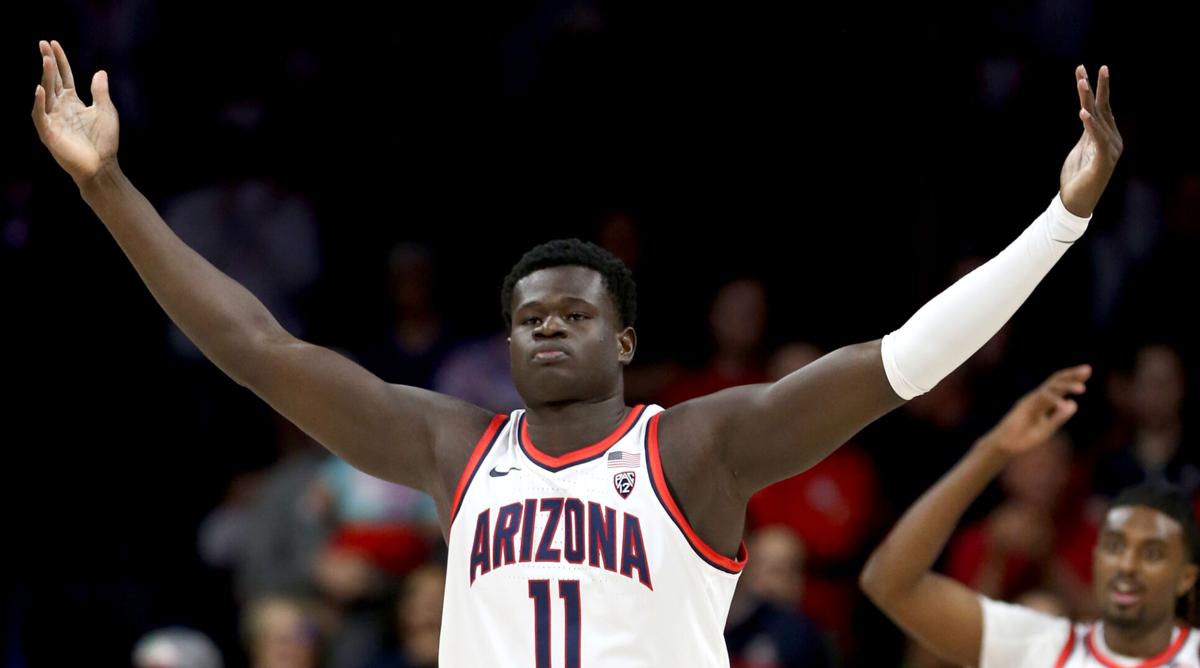For Arizona coach Tommy Lloyd, a four-day Christmas break is about visiting family, relaxing and what he calls a list of “things to chew on.”
Not a Santa list. A basketball to-do list.
There’s really no way to get away from it.
“I don’t know if your mind ever turns off when you do this for a living,” Lloyd said Thursday, after the Wildcats wrapped up pre-Christmas play at 12-1 with a 93-68 win over Morgan State. “But I’m definitely gonna kick back a little bit.”
Lloyd does have plenty of reasons to relax and feel good. For the second season in a row, his Wildcats exceeded expectations early and lost just one game before Christmas, climbing up to No. 5 in the Associated Press Top 25 poll, thanks in large part to what KenPom.com rates as the most efficient offense in the country.
“From this point of the season, I think it’s an A,” Lloyd said. “It’s pretty hard to argue that. I mean, probably not 100%. Maybe not an A+, but it’s an A.”
So, mostly good, and some bad things, to think about. While Lloyd didn’t reveal what’s on his list, this much is clear after 13 games:

Arizona forward Azuolas Tubelis rises to dunk during the Wildcats' win over Morgan State.
Their offense is second to none...
Not only are the Wildcats scoring more points per 100 possessions (120.1) than anyone in Division I, but they’re also leading the nation in 2-point field-goal percentage (62.5) and overall “effective” field goal percentage (with a 50% bonus for 3-point shots) at 60%. In raw stats, Arizona scores the second-most points (90.2) per game, behind only James Madison (93.2).
All this is possible in large part because of how Arizona’s high-low post duo of power forward Azuolas Tubelis and Oumar Ballo has been behaving. Both nearly averaged double-doubles during the Wildcats’ 11 nonconference games — Tubelis with 19.6 points and 8.6 rebounds, Ballo with 17.5 points and 9.5 rebounds — while shooting with consistent efficiency.
“They’re a force in there,” Lloyd said. “You just don’t see that type of one-two punch in there.”
Ballo, who has the second-best field goal percentage (74.2) nationally, picked up Maui Invitational MVP honors after averaging 21 points and 10.7 rebounds per game in UA’s wins over Cincinnati, San Diego State and Creighton.
“Oumar gets an A+,” Lloyd said. “He’s been incredibly consistent. On the offensive end, he’s delivering. He’s never gonna be Rick Barry (Ballo is only 57% at the free-throw line) but he’s making them when he has to, and it’s just the foul pressure he’s putting on the other team.”
While Ballo’s performance so far has been a drastic jump from a year ago, when he played behind the now-departed Christian Koloko, Tubelis is a returning all-Pac-12 player … who is now making a push to be the conference MVP.
Tubelis not only leads the Wildcats in scoring (20.1 points per game) and is second in rebounding (8.7 rebounds per game) to Ballo but also, at 6-foot-10 forward leads Arizona in steals with 14. Many of those turn into dunks on the other end, most vividly the one he swiped away from Morgan State’s Isaiah Burke on Thursday.
After grabbing the ball from the 6-1 Burke on the perimeter, Tubelis dribbled down the left sideline and, when Burke tried to slap the ball away, picked it back up and kept dribbling downcourt for a dunk.
“I don’t know if he can recreate that again — you know, I’ve seen him try some of the things that haven’t worked,” Lloyd said, chuckling. “But ‘Zu is really coming on. He’s so consistent, he scores in different ways, (making) a couple of 3s today, he’s handsy on defense, he gets out in transition, he’s hitting the offensive glass.
“I love where he’s at, and I think he’s going to continue to improve.”
… but their defense struggles at times.
Arizona’s defensive efficiency ranks just 67th, with the Wildcats allowing opponents to score an average of 96.3 points per 100 possessions. Despite their inside dominance offensively, Arizona also allows opponents to hit 45.4% of their two-point shots.
Moreover, UA’s opponents also are making 33.5% of their 3-point shots, a mediocre defensive stat that nonetheless is also subject to a team’s defensive philosophy. Without Koloko around to clean up mistakes with his intimidating rim protection, the Wildcats have had to adjust how aggressively they want to guard the perimeter.
Other strategies such as ball-screen coverage decisions can affect a defense’s perimeter performance, too.
“It’s a really interesting thing,” Lloyd said. “There’s different schools of thought and I think you can afford to give up a few more 3s if you’re doing a great job protecting the paint and limiting free throws. So there’s a give and take to all this stuff.
“Traditionally, I’ve been a guy that would be way more comfortable taking away 3s, and then relying on length and athleticism for rim protection and size in the paint. Those are the little things we got to figure out and that’s my job to put this team on the right path.”
Some of the Wildcats’ defensive issues might also be simply about effort.
Just 1-8 against Division I teams after Thursday, Morgan State went out and hit 12 of 23 3-pointers on Thursday. To guard Courtney Ramey, one of Arizona’s best perimeter defenders, that number was a sign the Wildcats needed to take the Bears more seriously.
“When a team is coming into our building and they see us ranked top five in the country, they want to knock us off,” Ramey said. “So they’re gonna play their best games and we’ve got to understand that.”
Overall, Lloyd said the Wildcats have a “lot of room for growth” defensively, especially after they figure out exactly how they want to allocate their resources on that end of the floor.
“Philosophically, we kind of went one direction and then another direction and maybe we need to get in between those areas a little bit,” Lloyd said. “I’ve just got to get comfortable pinpointing game-by-game what we’ve got to do to be better.
“I don’t look at the analytic numbers. I know what our efficiency ratings are, but I don’t look at how they compare to other people because I’m just focused on what we’ve got to do to win the next game. But I know defensively overall, we can continue to grow and get better.”

Arizona guard Pelle Larsson, left, and forward Azuolas Tubelis celebrate as the clock runs out on a 75-70 win over Tennessee.
All of their starters can go off...
While Tubelis and Ballo are the Wildcats’ most consistent performers, all of their five starters average in double-figure scoring, and all have taken turns leading Arizona.
In just his second game of the season after the NCAA held him out for three early games, Ramey had 12 points against San Diego State while hitting 5 of 5 3-pointers.
At small forward, while also defending bigger forwards, junior Pelle Larsson had a double-double of 16 points and 10 rebounds in UA’s season opener against Nicholls, while posting 16 points against Indiana and going 9 for 9 from the free-throw line against Tennessee.
“He’s getting there,” Lloyd said of Larsson. “I still think there are some possessions that we’re going watch and to be able to pinpoint areas that he can grow on.
“The one thing I know about Pelle is he might be a little bit of a slow starter, but he’s a strong finisher.”
And, while averaging the eighth most assists per game (6.1) in the country, junior point guard Kerr Kriisa hit six 3-pointers against Utah Tech and Montana State. He posted his second career triple-double (14 points, 11 rebounds and 12 assists) against Southern.
Kriisa has had some of his biggest assist games when his shot has been off, too: The Estonian junior guard had nine assists to only one turnover in UA’s win over Creighton in the Maui Invitational final when he was 1 for 4 from 3-point, and had nine assists to two turnovers on Nov. 30 in UA’s loss at Utah, when he missed all five 3-pointers he took.

Arizona guard Cedric Henderson Jr. works his way under Montana State forward Great Osobor in the second half of Tuesday's game.
… but their bench has been of minimal support
Except for wing Cedric Henderson, who started the first three games of the season when Ramey sat out an NCAA penalty for playing in a predraft camp last spring, the Wildcats haven’t received much from their reserve players in bigger games.
UA ranks No. 222 nationally in bench points per game with 19.1. That raw stat that doesn’t reflect the Wildcats’ uptempo pace ... and does include games when the bench players loaded up in blowout wins over Nicholls (45 bench points), Southern (28) and Texas A&M Corpus Christi (51).
In Arizona’s bigger games, the story has been much different. The Wildcats’ reserves, including Henderson, averaged just 12.3 points over three Maui Invitational games. They scored just seven at Utah and zero against Tennessee.
Lloyd said after UA’s win over Tennessee game that it was “just one of those days,” and that he didn’t have a set formula for the reserves to produce. But he has also expressed concern that the Wildcats need more from their bench, even though he only played the five subs below Henderson in the rotation a total of 28 minutes three days later in UA’s 85-64 win over Montana State.
“I want to play that bench more and it’s my fault,” Lloyd said. “When you put your bench in, you don’t want to be at a disadvantage. And I felt at times tonight like, ‘Man, if I sub too much, we might be a little bit of a disadvantage.’ That’s a credit to Montana State.”
Two days later, against Morgan State, Lloyd threw caution to the wind. He played reserves heavily throughout the second half even though the Wildcats’ lead barely stayed in double digits until the final minutes.
“At some point, you’ve got to go for it,” Lloyd said. “To see the young guys come along (is good) because we’re gonna need them. I’ve been continuing to say that and I think they’re getting a little bit closer.”
Against Morgan State, Lloyd gave double-digit minutes to sophomore wing Adama Bal, freshman big man Henri Veesaar and freshman guard Kylan Boswell, who also played 15 minutes against Montana State.
They might be tougher…
After earning a No. 1 NCAA Tournament seed last season, only to struggle in the NCAA Tournament against physical teams from TCU (in a second-round overtime win) and Houston (in a Sweet 16 loss), Lloyd and his players made a point of working on their physicality.
Tubelis appeared especially motivated after scored a total of seven points on 2-for-14 shooting over the TCU and Houston games. Lloyd said he would address the issue both in his recruiting and on the coaching floor.
Then the Wildcats went out and, among other examples, took 27 trips to the free-throw line against a hard-nosed team from Tennessee on Dec. 17, their biggest win of the season so far.
“To get a gritty ‘W’ against a team like Tennessee, it was a great night,” Lloyd said afterward, adding later: “You’ve got to fight force with force. It’s really the only way to do it. I thought we put a lot of foul pressure on them.”
Overall through its 11 nonconference games and two early Pac-12 games, Arizona’s ratio of free throws taken to field goals taken — one way to measure how physical and aggressive a team can be — has risen No. 17 in the country at 41.9%. They were 54th last season at 34.9%.
… but they sometimes take it too far.
Arizona also sends its opponents to the line enough that those teams also take a relatively high ratio of free throws to field goals (25.4%, the 68th most nationally). The Wildcats commit 17.8 fouls a game, up from 16.7 last season, and already have five technical fouls — including two by Kriisa, one against Tennessee and another against Montana State.
Kriisa said he picked up the technical against the Bobcats for complaining “in the heat of the moment” about Larsson not getting a call, and apologetically described Lloyd’s firm message to the Wildcats afterward.
He said “No more Ts. None at all,” Kriisa said. “None at all. That was on me and I gotta do a better job on that.”
After the Montana State game, Lloyd wasn’t terribly wild about the way Larsson was handling things, either. While Larsson has been one of the Wildcats’ toughest players, sometimes Lloyd found he stepped over a line.
“Pelle is a heck of a ballplayer. … he’s just got to tone down the drama,” Lloyd said. “I’m not saying he’s trying to accentuate every foul. It’s just, ‘score the basket.’ I mean, he had a bank he hit and he got fouled and it looked like somebody shot him. He’s too good of a player to do that.
“So I just told him: ‘You’ve got a responsibility. When you get on that cut or that fast break, we need a basket. We don’t need a highlight. We need a basket.’ Too often, there’s just a little extra.”
Lloyd said Henderson pulled a similar stunt on a one-on-three fast break that ultimately produced nothing.
“We don’t get either foul call. We get nothing,” Lloyd said. “We need results and that’s my message to them.
“I love those guys. I tell them I love them all the time. But I want them to be great basketball players and it’s my job to tell them the hard things. I’m probably not always right but generally I think I have their best interests in mind.”








